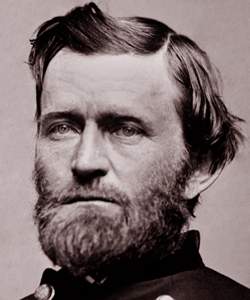Ulysses S. Grant (American National Biography)
Scholarship
In mid-April 1863 Grant set in motion a campaign that won acclaim as the most brilliant of the war. Because of its high risks, Sherman and other subordinates opposed his plan, but Grant, like Robert E. Lee, was a great commander because of his willingness to take risks. He sent Union cavalry under Colonel Benjamin Grierson on a raid through Mississippi as a diversion. He ordered Union gunboats and transports under Rear Admiral David Dixon Porter to sail directly past the Vicksburg batteries to a point thirty miles south, where they could ferry the troops, who had toiled through the swamps down the west bank, across the river. Most of the fleet got through, and once across the river, Grant's army cut loose from anything resembling a base of supplies. They had to live off the country until they could fight their way back to contact with the river above Vicksburg.
Instead of driving straight north toward Vicksburg, Grant marched east toward the state capital of Jackson, where a Confederate army was being assembled by General Joseph E. Johnston. Grant then intended to turn west and invest Vicksburg, defended by another Confederate force under General John C. Pemberton. During the next three weeks Grant's men marched 130 miles, fought and won five battles against separate enemy forces that, if combined, would have nearly equaled Grant's 45,000, and penned the enemy behind the Vicksburg defenses.
Instead of driving straight north toward Vicksburg, Grant marched east toward the state capital of Jackson, where a Confederate army was being assembled by General Joseph E. Johnston. Grant then intended to turn west and invest Vicksburg, defended by another Confederate force under General John C. Pemberton. During the next three weeks Grant's men marched 130 miles, fought and won five battles against separate enemy forces that, if combined, would have nearly equaled Grant's 45,000, and penned the enemy behind the Vicksburg defenses.
James M. McPherson, "Grant, Ulysses S.," American National Biography Online, February 2000, http://www.anb.org/articles/05/05-00291.html.











